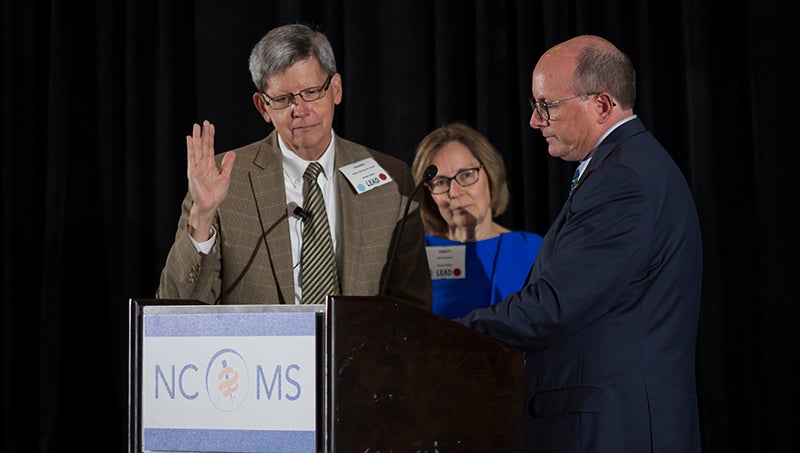Washington native sworn in as NC Medical Society’s 166th president
Published 7:08 pm Friday, October 18, 2019

- IMPROVING HEALTH: Dr. Palmer Edwards (left), standing next to his wife, Marty, was sworn in as North Carolina Medical Society’s new president by outgoing President Timothy J. Reeder, MD, MPH, FACEP, a Greenville Emergency Department physician, earlier this month. (North Carolina Medical Society)
From North Carolina Medical Society
RALEIGH — Palmer Edwards, MD, DFAPA, a psychiatrist practicing in Winston-Salem, was sworn in as the North Carolina Medical Society’s 166th president on Oct. 4, at the Society’s annual LEAD Health Care Conference.
Edwards, son of the late Dan and Elaine Edwards, longtime Washington residents, is a 1970 graduate of Washington High School.
An NCMS member since 1992 — nearly 30 years — Edwards has been involved in many important leadership roles during that time including serving on the NCMS Foundation’s Board of Trustees and being a member of the NCMS Board of Directors for the past 10 years. Edwards is an alumnus of the Society’s Leadership College and has mentored future health care leaders through the program.
He is past-president of the NC Psychiatric Association, past-president of the Forsyth-Stokes-Davie County Medical Society and founding president of the Forsyth County Psychiatric Society. He also served on the Board of Directors of the NC Professionals Health Program (formerly the Physicians Health Program, NCPHP).
Edwards is a graduate of the Wake Forest University School of Medicine and completed both his adult psychiatry residency and child and adolescent psychiatry fellowship at Vanderbilt University.
He is board-certified in adult psychiatry and child and adolescent psychiatry. In addition to his private practice, he is a clinical associate professor in the Wake Forest University School of Medicine’s Department of Psychiatry and Behavioral Medicine and a psychiatric consultant to the Wake Forest University School of Medicine’s Adult Medicine Clinic.
Medicine runs in his family. Edwards grew up in the eastern North Carolina town of Washington, the son of a physician. He saw firsthand the challenges and rewards of being a small-town doctor. Later, a University of North Carolina/Duke University health policy course placed him in Washington, D.C., working for the chair of the U.S. House Public Health Committee. This experience helped him appreciate the nuances and complexities involved in developing sound public policy.
In his inauguration remarks Oct. 4, at the NCMS’ Leadership Dinner in Raleigh, Edwards used an anecdote about a mysterious rash that had stumped a series of medical professionals, to illustrate that sometimes careful listening and observing can solve medical “mysteries.” He enumerated the many “seismic shifts” in health care, some of which have led to great advances in patient outcomes. Yet costs continue to rise and physicians are increasingly burned out. He urged a commonsense approach to improving the health care system by moving from a mindset of “fixing” patients to one modeled on “research and development” in which physicians and physician assistants are better able to “think and reflect” and listen and observe their patients.
“My point is not to scold or to be overly critical of a health system in its current form, which does lots of good for so many people,” Edwards told his colleagues. “Rather, we, as the NC Medical Society, need to continue to use our influence to aid our members. We might do this by advocating for some version of the ideal ‘research and development practice’ model I described. We need to help doctors and PAs get off the ‘fixing-people production line.’ Through the Society’s efforts, we will continue to look for the best ways to support our members, so that they can do what they do best — improving their patients’ health by providing compassionate care of the highest quality.”




